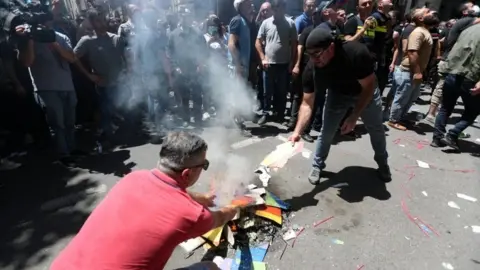Georgia: Cameraman dies after attack at anti-Pride march
 Reuters
ReutersPolice in Georgia have launched a criminal investigation into the death of a cameraman who was attacked while covering an anti-Pride event.
Lekso Lashkarava suffered severe facial injuries during the attack in Tbilisi on 5 July but was discharged from hospital. He was found dead on Sunday.
The Georgian interior ministry said four people have been arrested.
Pride was called off on Monday after violent groups targeted the offices of LGBT campaigners.
While discrimination against sexual orientation is illegal in Georgia, the country - which lies between Eastern Europe and Western Asia - remains very conservative.
Lashkarava was attacked by anti-LGBT protesters who were demonstrating against the planned Pride events. He was one of more than 50 journalists attacked on that day.
Lashkarava's editor at TV Pirveli said the cameraman had complained of severe pain when he saw him on Friday.
An official cause of death has not been announced. Georgia's interior ministry has announced that it has launched a criminal investigation.
Prime Minister Irakli Gharibashvili described Lashkarava's death as an "unimaginable tragedy" but he faces calls to step down. He, along with his government, has been accused of orchestrating a violent campaign against journalists by people in the media industry.
Two marches are set to take place on Sunday. One is calling for the government's resignation and another has been organised by representatives from media outlets.
Reporters Without Borders condemned last week's attacks, saying journalists "sustained injuries that included concussion, chemical burns and broken arms".
It accused authorities of "culpable passivity" and said police had failed to protect reporters.
Activists had organised five days of Pride events but in a statement on Monday, Tbilisi Pride said local authorities had "not only failed to secure safety of the queer community and our supporters, but actively hampered us from exercising the right of assembly" ahead of the planned march.
Georgia's interior ministry had previously called on the organisers to cancel the Pride march due to safety concerns while Mr Gharibashvili described the event as "unacceptable for a large segment of the Georgian society".
The Georgian Orthodox Church, which strongly opposes LGBT activists, had also called for a public prayer meeting against the Pride event.
It is not the first time that there has been violence at an anti-LGBT march. In 2019, far-right protesters joined demonstrations against the premiere of Georgia's first LGBTQ film in Tbilisi.
